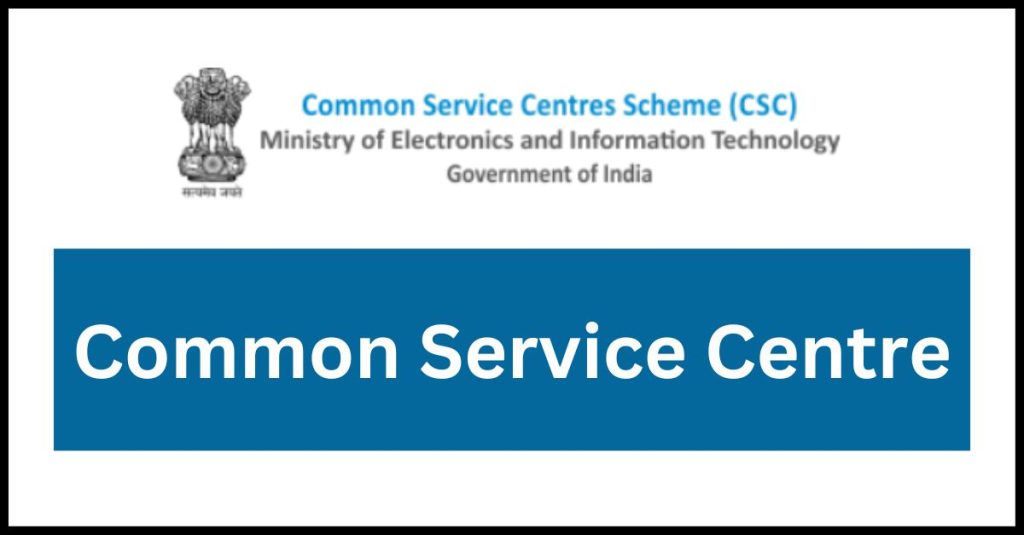Apna CSC: Common Service Centre (CSC) is a part of the National E-Governance Plan Scheme of the Indian Government @www.csc.gov.in. Apna CSC was approved in the year 2006 and works under the administration of the Department of Electronics and Information Technology (DEITY), Ministry of Communication and Information Technology, Government of India. The Common Service Centre scheme is working across the various districts of the country.
Apna CSC – Common Service Centre
| Name of the Scheme | Common Service Centre (CSC) Scheme |
| Article Category | Information about Apna CSC, digital service Kendra, digital seva |
| Responsible Authority | Ministry of Electronics and Information Technology (MeitY) |
| Area served | Rural India |
| Approved in | 2006 |
| Formulated by | Government of India |
| Mode of registration | Online |
| Official Website | www.csc.gov.in |

Common Service Centre (CSC)
Common Service Centre Scheme is one of the programs of the Government of India under the Digital India Program. It is a wide network that caters to PAN India. CSCs are the service delivery points enabled with Information and Communication Technology (ICT) for the delivery of various public and private services to rural citizens of India.
The government services delivered through the network of CSCs include services in the area of education, agriculture, health, FMCG products, utility payments entertainment, banking, financial services, etc.
Objectives of Apna CSC?
The Common Service Centre Scheme was launched with various objectives. The main objective of CSC is to achieve rapid social and economic change in rural India by integrating the two goals of profit-making and social service. Check the official objectives of CSC below-
- To provide access to information to all remote and rural citizens of India.
- To provide access to quality education and skill development to Indian citizens (majorly rural population).
- To provide efficient delivery of public services that are mainly G2C (Government to Citizen) & B2C (Business to Citizen).
- To provide cost-efficient & quality healthcare services to citizens.
- To promote rural empowerment, collective action for the empowerment of society and to enable community participation.
CSC Services
CSC provides a number of services. Below, we have shared a brief note on all the services that a CSC provides to the citizens across the country-
- Government to Citizen Services (G2C)
To deliver Government Citizen services is the key mandate of CSC. The government keeps launching various services for its citizens through its various Departments and Ministries. CSCs are the entities that serve to deliver these government services to remote areas and rural citizens through their network.
Some of the G2C services that are delivered through the network of CSCs are Bharat BillPay, PAN card, Passport, FASTag through CSCs, Pradhan Mantri Awas Yojna (add link), FSSAI, Swatch Bharat Mission, Soil Health Card, Election Commission Services, e-District etc.
- Business to Citizen Services (B2C)
These are the services that are mainly provided by private businesses to the citizens. CSC helps to deliver these services to rural citizens through Digital Seva Portal. B2C services include Mobile Bill payments, Mobile recharge, BTH recharge etc.
- Financial Inclusion
The service of financial inclusion is aimed to create awareness among the rural citizens about digital transactions, and digital financial services and encourage them to make cashless transactions.
The major financial services that are delivered through CSCs include VLE Bazaar (a rural e-commerce venture), GST Suvidha Provider, skill development, Banking services, insurance services, Pradhan Mantri Fasal Bima Yojana (PMFBY), Pension services, etc.
- Agriculture
CSCs also deliver various government services related to agriculture.
- Education
Through the CSC platform, the government also provides various schemes related the education and education, for rural students. CSC provides education and certificate courses under the digital literacy mission. Some of the education services provided through the CSC platform include NDLM-DISHA, NABARD Financial Literacy Programme, Legal Literacy Programme, Cyber Gram Yojana, Tally Kaushal Praman Patra, GST, and various other programs.
- Health services
Along with educational and agricultural services, CSCs also deliver a number of health services to rural citizens. Some of the health services are Telehealth consultations, Pradhan Mantri Jan Aushadhi and a number of Diagnostics services such as 3Nethra Kits, Hello Health Kits, Thyrocare, JIVA Ayurveda scheme, health home etc.
- Digitize India Platform
It is the platform for digitizing all the physical records and data and reducing the piles of files and paper in the offices.
- DigiPay
DigiPay is an aadhaar-enabled payment service of the Government that is delivered through CSC in rural areas. DigiPay facilitates payment from government schemes such as NREGA, Handicapped, Social Security pension, old age pension of any state or government entity by using an Aadhaar card.
- eSign
It is basically an online electronic signature service. Through this users can digitally sign a file or a document. It is very handy when official and important documents like agreements and contracts are to be sent online.
CSC Implementation Framework
CSC has a three-tier implementation framework-
- Village Level Entrepreneur (VLE)- At the first level VLE serves people at the local level. VLE serves rural consumers at the basic level in a cluster of 5-6 villages.
- Service Centre Agency (SCA)- It is the second-level/middle-level entity that serves the consumers indirectly by managing and operating VLEs in one or more districts. One district usually covers 100-200 VLEs.
- State Designated Agency- At the third level, SDA serves the consumers at the state level by providing requisite, policy, content and support to SCAs.
CSC- Project Components
The primary project requirements/components of CSC include-
- Connectivity
- Technology
- Content & Services
- Business Model and Capacity Building
Also, check the infrastructure requirement of CSC-
- A Building/ Room must be having a space of 100-150 Sq. Ft.
- PC (computer) with licensed Windows 7 or above.
- Minimum two PC with 5hour battery backup or with a portal generator.
- RAM with a minimum storage capacity of 2 GB
- Hard Disc Drive of minimum of 250 GB
- Two Printers
- Biometric/ IRIS authentication scanner (in case of Banking services)
- V-SAT/Wired/Wireless connectivity
- Web Camera/ Digital Camera
- CD/DVD Drive
FAQs
CSC is a Special Purpose Vehicle (CSC SPV) that connects local and rural people with Government departments, Private and government institutions such as banks, insurance companies, and other service providers/ companies in the private sector by using information and communication technology at citizen service points.
Eligible citizens of rural India who want to serve people by being part of this scheme can register online. They can get the complete registration procedure here.
If a person wants to register as a VLE then he/she does not have to pay any registration fee or any other charge. Registration for VLE is completely free.
CSC project needed Content & Services, Connectivity, Business Model & Capacity Building, and Technology.
CSC Contact Details
CSC e-Governance Services India Limited,
Ministry of Electronics & Information Technology,
Electronics Niketan,
6, CGO Complex, Lodhi Road,
CGO Complex, Pragati Vihar
New Delhi – 110003
CSC helpline number
Toll-free- 1800-3000-3468
Phone No.- 011-24301349
Email- helpdesk@csc.gov.in
Website- csc.gov.in
In case the user feels any difficulty operating or any other issue related to Common Service Centre, then they must contact the concerned authority and ask for help.
You can also contact us through the comment box below for any problem faced in
Common Service Centre, Apna CSC, Digital Seva. Our team will help you in solving the problem or query. We have a dedicated team that responds to questions in fast possible time.
Common Service Centre is a very good scheme launched by GOI and it is now in phase 2 known as CSC 2.0.






